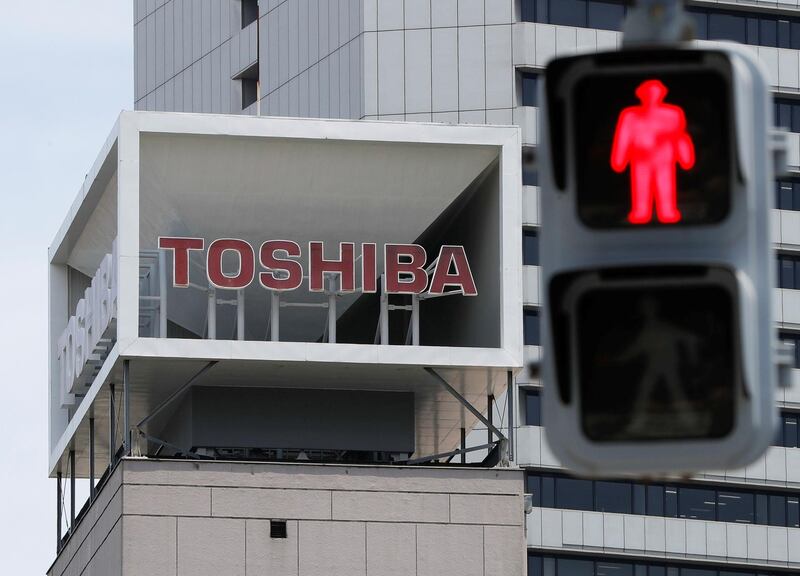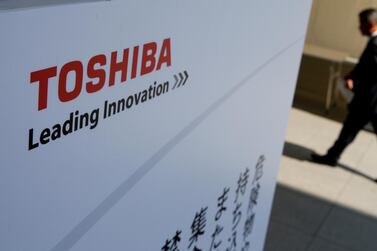Toshiba said it will drop two existing directors from its board as major shareholders demanded accountability after a probe showed unfair practices in last year’s selection process.
The conglomerate will not put forward the names of Junji Ota and Takashi Yamauchi for another term, it said in a statement after a special meeting on Sunday. It also will not reappoint executive officers Masayasu Toyohara and Masaharu Kamo, the company said.
An independent probe showed Toshiba sought government help in an attempt to influence a key shareholder vote that installed its slate of directors. The company “devised a plan to effectively prevent shareholders” from exercising their rights at a July 2020 meeting, working with Japan’s trade ministry to counter activist investors, according to the 139-page report released last week and overseen by three lawyers.
“We are taking points made by the lawyers seriously and committed to find out, with help from outsiders, and report what happened promptly with as much transparency as we can,” Toshiba said. It will hold a press conference on Monday.
The company’s shares rose just more than 2 per cent on Monday in Tokyo trading.
Advisory firm Institutional Shareholder Services recommended a vote against Mr Ota, Mr Yamauchi and three other Toshiba board members following the probe, namely Osamu Nagayama, Nobuyuki Kobayashi and Ayako Hirota Weissman, according to a statement, reiterating the findings of the investigation that showed that the July 2020 shareholder meeting “was not fairly managed”.
Toshiba worked in unison with the ministry to exert pressure on 3D Investment Partners, now its third-largest shareholder, which impacted its voting decisions, and to influence how Harvard University’s endowment fund would vote.
Four outside directors at Toshiba – Jerome Thomas Black, Paul Brough, George Raymond Zage and Weissman – put out a separate statement in support of the shift in board nominees.
“These changes, we believe, together with further steps to be taken in future, are an important step in moving towards improved returns to shareholders and enhanced corporate governance,” they said. “We look forward to working with chairman Nagayama whom we support to lead the board’s efforts to achieve the best possible outcome for stakeholders, including shareholders.”
3D Investment Partners demanded the resignation of Mr Nagayama and three directors, Reuters reported on Sunday, citing a letter from the shareholder. It didn’t name the three directors.
The independent probe also details how then-chief executive Nobuaki Kurumatani met with Yoshihide Suga, at the time the chief cabinet secretary and now the prime minister of Japan, ahead of the annual general meting to explain the situation in person.
On another occasion, senior Toshiba executive Mr Kamo met Mr Suga, who the report said expressed support for “aggressive” action to use the Foreign Exchange and Foreign Trade Act, recently enacted legislation designed to protect industries core to national security. Mr Suga on Thursday rejected the contents of the report.
“I know nothing of this,” Mr Suga said when asked by reporters in Tokyo about comments attributed to him in the report. “There was no such thing.”
The findings emerged from a probe proposed by Singapore-based Effissimo Capital Management – Toshiba’s largest shareholder – and approved in March. The standoff between the secretive fund and one of the country’s most storied conglomerates has become a litmus test for Japan Inc and corporate governance across the world’s third-largest economy.
At a briefing in Tokyo on Friday, Japanese Trade Minister Hiroshi Kajiyama denied that he had asked a former senior adviser, Hiromichi Mizuno, to get involved with Toshiba, although he said Mr Mizuno had given advice on occasion. Mr Kajiyama said the panel’s report didn’t shed definitive light on what happened, but didn’t rule out the possibility that the ministry will start its own investigation into the findings.
The four external board members of Toshiba’s board called the report “deeply disturbing”, and said change was needed in both the board and management.






